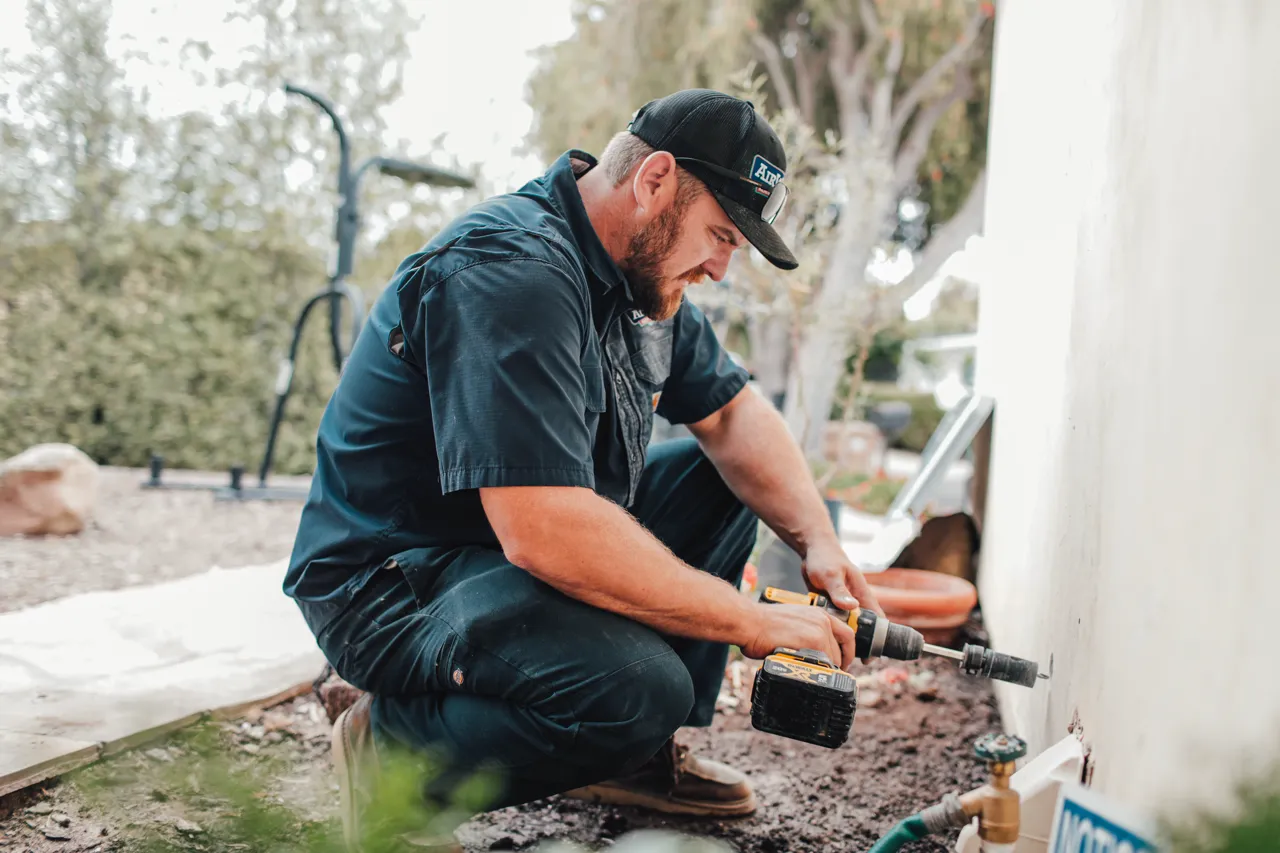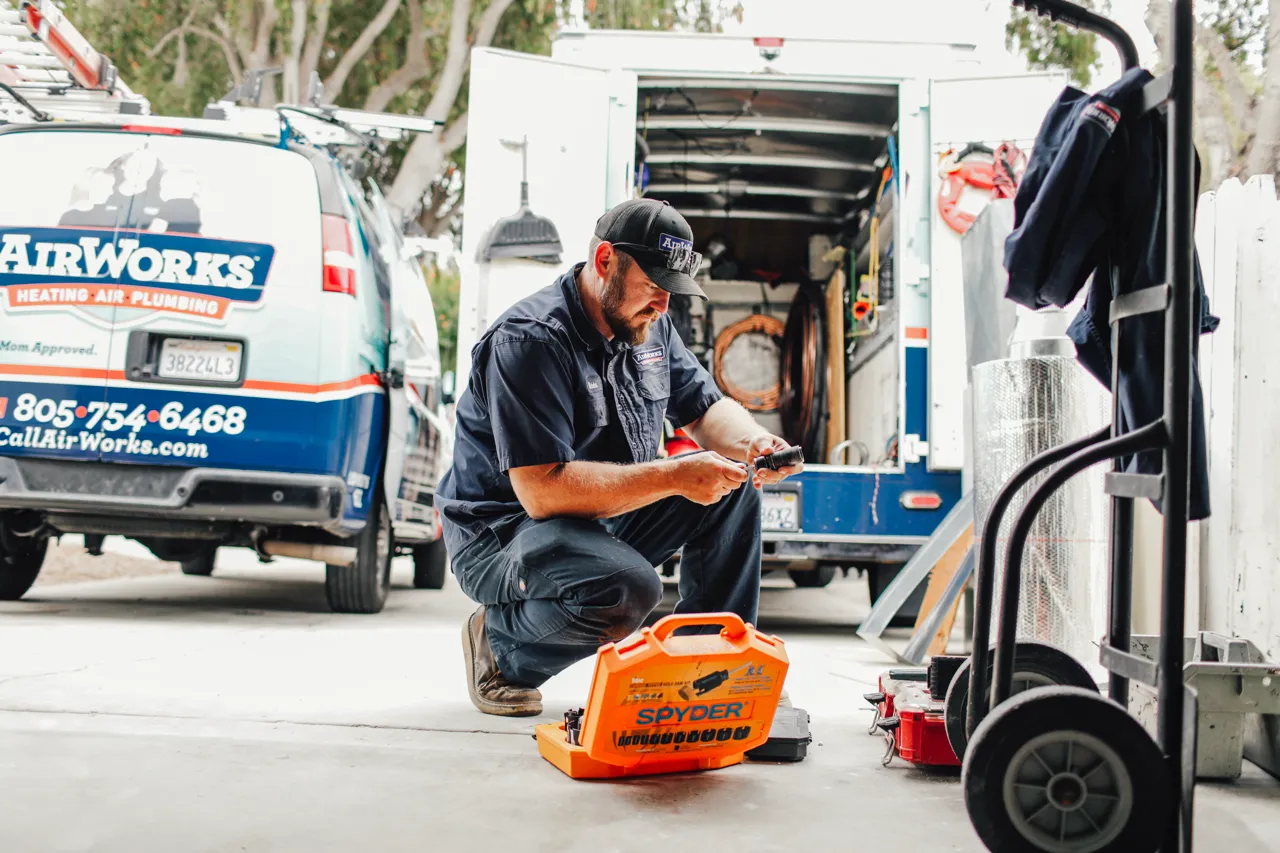AC Diagnostic Service: What to Expect When Your Home's AC is on the Fritz

Why Understanding Your AC Diagnostic Process Matters
An AC diagnostic service is a comprehensive evaluation performed by HVAC technicians to identify problems in your air conditioning system before they lead to complete breakdowns or costly repairs.
What AC diagnostic service includes:
- Visual inspection of all system components
- Performance testing with specialized tools
- Refrigerant level and pressure checks
- Electrical connection testing
- Airflow and temperature measurements
- Leak detection throughout the system
- Digital report of findings and recommendations
When your AC starts blowing warm air on a scorching Ventura County day, you need answers fast. Is it a simple fix like a dirty filter, or something more serious like a failing compressor?
Professional technicians use advanced diagnostic tools to pinpoint exactly what's wrong with your system. This saves you from the guesswork and prevents small issues from becoming major headaches.
The diagnostic process typically takes 60-90 minutes and covers everything from your thermostat settings to refrigerant pressures. Technicians check electrical connections, inspect coils for damage, test airflow, and look for signs of leaks or wear.
Understanding what happens during diagnostics helps you make informed decisions about repairs and maintenance. You'll know whether that strange noise means a quick fix or if it's time to consider replacement options.
As Stephanie Allen, I've worked with numerous homeowners navigating complex service decisions and understand the importance of transparent communication during AC diagnostic service appointments. My business background helps me explain technical processes in terms that make sense for homeowners making important investment decisions.

Common Signs Your AC System Needs a Diagnostic
Your air conditioner has its own way of crying for help – and learning to recognize these distress signals can save you from a complete breakdown on the hottest day of summer. When your AC starts acting up, it's usually trying to tell you something important about what's happening under the hood.
Warm air blowing from your vents is probably the most obvious red flag that something's gone wrong. Instead of that refreshing cool breeze you're expecting, you get a disappointing puff of warm air. This frustrating problem could stem from anything from low refrigerant levels to a failing compressor that's given up the fight.
Weak airflow is another telltale sign your system needs attention. You might notice barely any air coming through the vents, even when your AC is running at full blast. This often points to clogged air filters, a struggling blower motor, or problems lurking in your ductwork that are choking off the airflow.
Does your AC seem to have commitment issues? Frequent cycling – where your unit keeps turning on and off like it can't make up its mind – is a classic symptom of trouble. This "short cycling" behavior often indicates an oversized unit, thermostat problems, or refrigerant issues that cause your system to cool too quickly, shut down, then restart in an endless loop.
High humidity levels in your home, even with the AC running, signal that your system isn't doing its dehumidifying job properly. Your AC should be pulling moisture out of the air while it cools, so if your home feels like a swamp, something's definitely off.
Strange smells wafting from your vents deserve immediate attention. A musty odor usually means mold or mildew has taken up residence in your evaporator coil or condensate drain pan. A burning smell? That's even more concerning and could indicate electrical problems or a motor that's overheating. If you're hearing unusual sounds along with these smells, our article on Why is my air conditioning making a hissing sound might help you identify what's happening.
Visible leaks or moisture around your indoor or outdoor unit are clear warning signs. While a little condensation is normal, puddles or excessive dampness could mean a clogged condensate drain line, frozen evaporator coil, or refrigerant leak. When you spot any of these issues, quick action is key – check out our guide on 6 Steps to Immediately Take if Your AC Breaks Down for immediate help.

What Noises Indicate a Problem?
Your AC should hum along quietly in the background, not announce its presence with a concert of concerning sounds. When your system starts making noise, it's usually calling out for help.
Squealing sounds often point to fan motor bearings that are crying out for attention or belts that have become loose or worn. Ignore these squeals, and you might face complete motor failure – nobody wants that expensive surprise.
Grinding noises are particularly worrying because they usually indicate metal-on-metal contact in the motor bearings. This grinding creates friction that can cause serious damage if you don't address it quickly. Think of it like driving a car with failing brakes – the longer you wait, the worse it gets.
Banging or clanking sounds are your AC's way of telling you something has come loose or broken inside. Whether it's in the compressor, fan, or motor, these loud noises demand immediate attention to prevent a small problem from becoming a system-wide disaster.
Hissing sounds might indicate refrigerant escaping from your system, especially if you're also noticing reduced cooling performance. Sometimes hissing points to a faulty expansion valve that's not regulating refrigerant flow properly. For more insight into AC sounds, take a look at What makes an AC squeak.
These noises aren't just annoying background sounds – they're early warning signals that can help you catch problems before they cascade into other components like your compressor or fan, turning what could be a simple repair into a major headache.
Why Is My Energy Bill So High?
When your energy bill arrives and makes you do a double-take, your AC might be the culprit. A sudden spike in energy costs, especially during cooling season, usually means your system is working overtime to keep you comfortable.
Inefficient operation is the main reason your AC starts guzzling electricity like a thirsty car. When components aren't working properly, your system has to run longer and work harder to achieve the same cooling results, and that extra effort shows up on your monthly bill.
Clogged filters are one of the biggest energy wasters in HVAC systems. When your filter gets packed with dust and debris, it's like trying to breathe through a pillow – your AC has to strain to pull air through, using more energy in the process. The good news is this one's easy to fix with regular filter changes. Learn more about this simple but crucial task in our guide on Changing your air filters: why, when, and how.
Refrigerant leaks force your AC to work much harder than it should. When your system is low on refrigerant, it struggles to cool your home effectively, leading to longer run times and higher energy consumption. Plus, these leaks can damage expensive components like your compressor and evaporator coils.
System strain develops as components age, get dirty, or start wearing out. Your AC might run longer cycles or struggle to maintain your desired temperature, both of which drive up energy usage. Over time, seals and connections can loosen, requiring the kind of preventative maintenance that an AC diagnostic service can identify before problems get expensive.
The Professional AC Diagnostic Service Process: What to Expect
When you schedule an AC diagnostic service with a professional team like ours, you're investing in a thorough evaluation designed to get to the root of your cooling problems. Our goal is to provide you with a clear understanding of your system's health and the best path forward.
The process typically begins with an initial inspection and a detailed interview with you, the homeowner. We'll ask about the symptoms you've noticed – when did the issue start? What sounds or smells have you detected? Your observations are valuable clues that help us narrow down the possibilities. This initial discussion helps us pinpoint the problem areas efficiently, whether you're in Ventura, Camarillo, or the broader Sacramento area.
Following the discussion, our technicians perform a visual component check of both your indoor and outdoor units. They look for obvious signs of wear, damage, or blockages, checking everything from the condenser coils to the refrigerant lines. This comprehensive approach is part of our commitment to quality HVAC Repair Ventura, CA and surrounding areas.

Key Components Inspected
During an AC diagnostic service, our skilled technicians carefully inspect several key components of your air conditioning system. This ensures that no potential issue is overlooked:
- Thermostat check: We verify that your thermostat is functioning correctly, accurately reading temperatures, and communicating properly with your AC unit. Sometimes, the simplest solution is a thermostat calibration.
- Air filter inspection: A dirty air filter can severely impede airflow and system efficiency. We inspect its condition and advise on replacement or cleaning. For tips on managing seasonal allergies, check out Air Filters to Combat Spring Allergies.
- Electrical connections: We check all electrical wiring and connections for loose terminals, signs of corrosion, or wear that could lead to intermittent operation or safety hazards.
- Capacitors and contactors: These crucial electrical components help start and run your AC's motors. We test them to ensure they are within operational specifications.
- Condenser and evaporator coils: We inspect both the outdoor condenser coil and the indoor evaporator coil for dirt, debris, or ice buildup, which can severely impact heat exchange and cooling efficiency.
- Refrigerant level check: Using specialized gauges, we accurately measure the refrigerant levels and pressures within your system. Low refrigerant is a common indicator of a leak, which we then work to locate. It's common for refrigerants to leak, and leaking refrigerants can damage your compressor and evaporator.
- Blower motor: We assess the blower motor's operation, ensuring it's moving air effectively through your ductwork and into your home.
- Condensate drain line: We check for clogs or blockages in the condensate drain line, which can lead to water leaks and potential mold growth. Our team is also adept at helping you Find and Fix Hidden Plumbing Leaks that might be connected to your AC.
Advanced Tools and Technology Used
Modern AC diagnostic service relies heavily on advanced tools and technology to provide precise and efficient problem identification. These tools allow our technicians to go beyond surface-level observations and dig into the intricate workings of your system:
- Manifold gauges: These essential tools allow technicians to accurately measure the pressure of the refrigerant within the AC system, indicating if there's a leak or an overcharge.
- Multimeters: Used to test electrical components, multimeters measure voltage, current, and resistance, helping to diagnose electrical issues like faulty capacitors or wiring.
- Leak detectors: Beyond pressure checks, electronic leak detectors and UV dye kits are used to pinpoint the exact location of refrigerant leaks, even those not immediately visible.
- Thermal imaging cameras: These cameras visualize temperature differences across components, helping to identify hot spots (indicating electrical issues or friction) or cold spots (indicating airflow problems or blockages) that are invisible to the naked eye.

- Digital diagnostic reports: Many modern tools connect to tablets or smartphones, allowing technicians to generate comprehensive digital reports of their findings, which can then be easily shared with you, providing transparent insights into your system's health. Some smart diagnostic tools even have built-in AC temperature charts to compare vent temperature against ambient air and humidity levels, providing a professional AC performance test.
These technologies ensure that our AC diagnostic service is thorough, accurate, and efficient, giving you peace of mind.
Why Regular AC Maintenance and Diagnostics are Crucial
Think of your home's air conditioning system like a finely tuned machine – because it is! Just like your car needs regular oil changes and check-ups, your AC system thrives on consistent maintenance and timely diagnostics. Investing in regular AC diagnostic service and maintenance isn't just about avoiding a hot summer day; it's about ensuring the long-term health and efficiency of your entire cooling system.

One of the most significant benefits is system longevity. Routine AC maintenance can extend the lifespan of your unit, often from 10-12 years to 15-20 years. By catching small issues before they escalate, you can prevent premature wear and tear on expensive components like the compressor. This proactive approach ensures your investment lasts longer.
Regular care also leads to improved efficiency and lower energy bills. A well-maintained AC runs smoothly, consuming less power to cool your home. Dirty coils, clogged filters, or low refrigerant levels force your system to work harder, which directly translates to higher energy consumption and a noticeable jump in your utility costs. Annual AC tune-ups can prevent major repairs and increase the efficiency of your air conditioning system. For more ways to save, check out Mom-Approved Tips for Keeping Your Home Cool for Less.
Furthermore, maintenance contributes to better indoor air quality. Regular cleaning of coils and filters helps remove dust, allergens, mold, and other contaminants from the air circulating in your home. It also plays a vital role in preventing costly breakdowns. A diagnostic check can identify potential problems, such as minor leaks or worn parts, before they lead to catastrophic failures. Addressing these issues early on is always more economical than emergency repairs. Our team offers reliable AC Repair Thousand Oaks, CA services, ready to help when you need us most.
Finally, consistent maintenance is often a requirement for warranty protection. Many manufacturers stipulate that annual professional maintenance is necessary to keep your warranty valid. Skipping these crucial checks could void your coverage, leaving you responsible for the full cost of any major repairs.
Professional Service vs. a DIY Approach
When your AC acts up, it might be tempting to grab a DIY kit or look up a quick fix online. However, for something as complex as your home's air conditioning system, a professional AC diagnostic service offers significant advantages over a DIY approach.
First and foremost, there are safety risks involved. AC systems operate with high voltage electricity and pressurized refrigerants. Without proper training and equipment, attempting repairs can be dangerous, leading to electrical shocks, refrigerant burns, or even explosions. Professional technicians are trained to handle these hazards safely.
Professionals also possess specialized tools and technical expertise that most homeowners don't. While a DIY recharge kit might seem convenient, these kits often use refrigerants that are incompatible with your system, potentially causing more harm than good by plugging valves and leading to more costly repairs. Our technicians have access to advanced diagnostic equipment, like manifold gauges and leak detectors, allowing for an accurate diagnosis of the problem. They understand the intricate workings of the system, including components like the compressor, condenser, and evaporator, and can pinpoint issues that a homeowner might easily miss.
Attempting DIY repairs can also void warranties. Many AC manufacturers require that all service and repairs be performed by licensed professionals to maintain warranty coverage. A single DIY attempt could leave you on the hook for future repair costs. While a DIY fix might seem to offer immediate savings, professional service typically leads to long-term savings by ensuring the repair is done correctly the first time, preventing further damage and ensuring optimal system efficiency. It's often more cost-effective to repair an older unit than to replace it, but sometimes replacement is the better option. For those considerations, see What to consider when replacing your HVAC system.
Preparing for Your AC Diagnostic Service Appointment
A little preparation on your part can go a long way in making your AC diagnostic service appointment smooth and efficient.
- Note symptoms: Before the technician arrives, take a few minutes to write down specific details about the issues you've observed. When did the problem start? What exactly is happening (e.g., warm air, strange noise, weak airflow)? Is it constant or intermittent? The more information you can provide, the faster and more accurately our team can diagnose the issue.
- Clear access to units: Ensure that both your indoor (furnace/air handler) and outdoor (condenser) AC units are easily accessible. Remove any clutter, furniture, or debris around them. This allows our technicians to work safely and efficiently without obstruction.
- Know system history: If you have any records of previous AC repairs, maintenance, or installations, have them ready. This information can provide valuable context about your system's past performance and help the technician understand its history.
- Prepare questions for the technician: Don't hesitate to ask questions! Jot down any concerns you have about your AC's performance, maintenance, or potential future issues. Our technicians are happy to explain their findings and recommendations in clear, understandable terms. For general tips, our 10 Expert Spring HVAC Tips to Consider can be useful.
Taking these simple steps helps us provide you with the most effective and timely AC diagnostic service possible.
Frequently Asked Questions about AC Diagnostics
We get these questions all the time from homeowners just like you who want to understand what happens during an AC diagnostic service. Let's explore the most common concerns and clear up any confusion.
Are diagnostics different for modern systems like heat pumps or ductless mini-splits?
Absolutely! Modern systems like heat pumps and ductless mini-splits are more sophisticated than traditional central air units, which means diagnosing them requires a different approach entirely.
Heat pumps are particularly interesting because they have a reversing valve that lets them switch between heating and cooling modes. This extra component adds another layer of complexity to the diagnostic process. When something goes wrong, our technicians need to check not just the usual suspects, but also whether this valve is functioning properly in both modes.
Ductless mini-splits present their own unique challenges. Instead of one indoor unit, you might have multiple indoor units throughout your home, each connected to a single outdoor unit. This means our technicians have to test each indoor unit individually and check how well they're communicating with each other. It's like diagnosing a network of connected devices rather than a single machine.
The system complexity of these modern units requires specialized knowledge that goes beyond traditional AC training. Our technicians stay up-to-date with the latest technology and have the specific tools needed to accurately diagnose these advanced systems. Understanding these systems' unique benefits, like those outlined in our article about 5 Hidden Benefits of Ductless Mini Split Systems, helps us provide better diagnostic services.
How long does a typical AC diagnostic service take?
This is one of the first questions homeowners ask, and honestly, the answer varies by issue and what we find when we start looking under the hood of your system.
For a straightforward problem with good system accessibility, we might wrap up in about an hour. But a thorough inspection that really gets to the bottom of a tricky issue usually takes longer. Most AC diagnostic service appointments run between 60-90 minutes, which gives our technicians enough time to be methodical without rushing through important checks.
Complex problems naturally take more time. If your system has been acting up intermittently, or if we're dealing with multiple interconnected issues, we might need to run additional tests or wait for certain conditions to occur. Sometimes the outdoor unit is tucked away in a hard-to-reach spot, or the indoor components are crammed into a tight attic space, which can add time to the process.
We'd rather take the time to get it right than give you a quick guess that doesn't solve your problem. After all, you're calling us because you want answers, not more questions.
Does a routine AC tune-up include a diagnostic check?
While these two services might seem similar, they're actually quite different in their purpose and scope.
A tune-up is preventative maintenance – think of it like your car's regular oil change. We're keeping everything clean, lubricated, and running smoothly to prevent problems before they start. During a tune-up, we clean coils, check refrigerant levels, inspect connections, and make sure everything is operating as it should. Our AC Tune-Up Ventura, CA and HVAC Tune-Up Ventura, CA services focus on this type of preventative care.
An AC diagnostic is problem-solving mode. You call us for a diagnostic when something's already wrong – maybe your AC isn't cooling, it's making weird noises, or it's stopped working altogether. We're playing detective, trying to figure out exactly what's causing the problem so we can fix it.
There's definitely overlap in checks between the two services. Both involve looking at components and testing refrigerant levels. But the mindset is completely different. During a tune-up, if we notice your refrigerant is slightly low, we'll top it off and make a note to watch it next time. During a diagnostic, if we find low refrigerant, we're going to hunt down exactly where it's leaking and why.
Sometimes tune-ups can uncover issues that weren't obvious to you yet. Maybe we find a small refrigerant leak or notice a component that's starting to wear out. When that happens, we'll recommend a separate, more focused AC diagnostic service to dig deeper and give you a complete picture of what needs attention.
Conclusion
When your AC starts acting up during those sweltering Sacramento summers, you now know exactly what to expect from a professional AC diagnostic service. It's not just about fixing what's broken – it's about understanding your system, making smart decisions, and keeping your home the comfortable sanctuary it should be.
Throughout this guide, we've covered the telltale signs that your AC needs attention, from warm air blowing through vents to those mysterious grinding noises that wake you up at night. We've walked you through the professional diagnostic process, showing you how trained technicians use advanced tools like thermal imaging cameras and manifold gauges to pinpoint problems with surgical precision.
Regular maintenance and diagnostics aren't luxuries – they're necessities. They protect your investment, keep your energy bills reasonable, and prevent those dreaded emergency breakdowns on the hottest day of the year. While DIY fixes might seem tempting, the complexity of modern AC systems really calls for professional expertise and specialized equipment.
At AirWorks Heating Air Plumbing, we've been serving homeowners across the greater Sacramento area since 2010, and we've learned that honest communication and reliable service make all the difference. When you're dealing with AC troubles, you deserve technicians who explain what they're finding in plain English and offer solutions that make sense for your situation.
Your comfort matters, and small AC problems have a way of becoming big headaches if left unchecked. Don't wait until you're sweating through another sleepless night or watching your energy bills climb higher and higher.
Ready to give your AC the attention it deserves? Schedule your AC maintenance in Thousand Oaks, CA today! Your future self will thank you when you're staying cool and comfortable all season long.


.webp)


